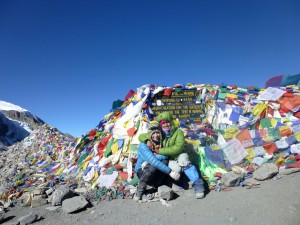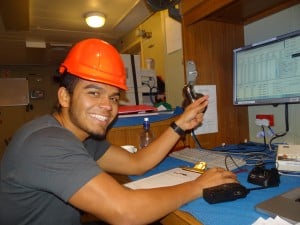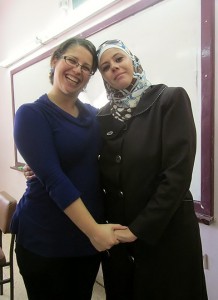
Photo: Barbara Grossman-Thompson, 2012-2013, Nepal (left), and her guide and research assistant Bhagwaati Pun, reach Thorong Pass in Nepal during a 30-day trek in the Annapurna Conservation Area.
When I boarded a plane bound for Kathmandu, Nepal in August 2012, I was cautiously optimistic about the trajectory of my proposed Fulbright U.S. Student Program Study/Research grant on tourism economies in the Annapurna Conservation Area. Two months after my arrival, it was increasingly clear that, like many researchers, I would have to adjust my expectations. I spent a month trekking in the Nepali Himalayas accompanied by my guide, research assistant, translator, and friend Bhagwaati Pun, when I realized that my original research plan would need to change fast. Proper paperwork was held up, the research had already been done, and more importantly, the Nepali people I spoke with were both kind and frank in conveying their disinterest in my intended project! I felt lost and anxious about how to proceed. As a graduate student conducting her dissertation fieldwork, I felt my academic future was on the line.
I decided to take some time off from the academic side of things and put all my attention toward further developing my relationships with the wonderful community I was living in. My affiliate organization, Empowering Women Nepal (EWN), bi-annually organizes a free, month-long training for women interested in working as trekking guides. In Nepal, guiding has traditionally been done by men. EWN’s guide training gives women the opportunity to continue their education, learn new skills, see other parts of the country, and earn their own salary. During my participation in the training, I drew on my own background as an outdoor educator to teach classes on wilderness first aid, professionalism, and managing client-guide relationships.



